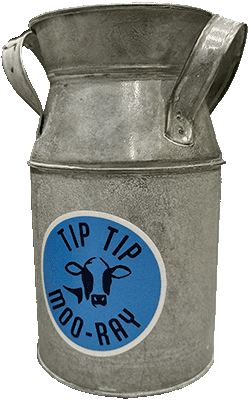Kenyans were protesting this summer against a finance bill proposed to pay off IMF loans by broadly increasing taxes on food, fuel, and other commodities.
Hawking raw milk cuts out the middlemen
In the midst of this levying of the nation’s burden onto everyone, most heavily affecting the poor, because targeting the rich who might afford it might be “unfair” to the individual rich person or corporation, the government of Kenya has imposed a ban on hawking milk, ie selling and distributing unprocessed raw milk farm-to-consumer instead of through food processors.
Health and safety reasons were of note, but the intention of protecting food processing corporations was also mentioned. This protects the middlemen while also ensuring the food supply is concentrated into an easier-to-tax venue. This may serve one or many individual interests, but this is all in the name of food security.
The government of Kenyan has enacted measures to financially support farmers who choose to sell to processing companies, through price setting and mandatory biweekly payments, but this still counts as a raw milk ban.
Reach out to info@getrawmilk.com to provide information.
Links
I’m not Kenyan, I might write more if a Kenyan appears, or if provided with more information – I just found this interesting – so here are some links. Some of these are directly relevant and some provide context leading up to the situation.
November 29, 2010 – ILRI Clippings: Why do dairy farmers ‘hawk’ milk through informal channels?
May 16, 2012 – ILRI Clippings: Small milk producers, hawkers and service providers turn handsome profits as Kenya’s dairy sector continues to expand
August 2013 – The Standard: Board bans hawking of raw milk
August 2013 – The Standard: VAT law changes fortunes for raw milk hawkers
January 29, 2013 – Business Daily Africa: Regulator bans milk hawking as shortage persists
September 1, 2013 – Nation: Dairy farmers cry foul over milk hawking ban
March 25, 2019 – Citizen Digital: Kenya Dairy Board Suspends Controversial Plan To Ban Milk Hawking
February 22, 2022 – BBC: Kenyan food prices: Why have they gone up so much?
June 14, 2023 – Nation: Milk intake at 40-month low as high prices put-off consumers
November 22, 2023 – Farmers Review Africa: Kenya launches Dairy Industry Sustainability Roadmap 2023–2033, aims at doubling farmers’ milk output
2024
January 10, 2024 – Capital Business: Milk Farmers Get Additional Sh5 Per Liter After President Ruto’s Directive
January 10, 2024 – Tuko: Kenyan Dairy Farmers Set to Benefit as Ruto Opens New KCC Factory, Increases Milk Prices
Jan 11, 2024 – Dairy Business Africa: Kenyan President pledges dairy sector reforms to boost farmer earnings
February 12, 2024: The Star: State allocates Sh900 million to KCC to stabilise milk prices
June 13, 2024 – Ruto Pledges Additional Ksh 2 Billion to Boost Dairy Sector Cooperatives
The President also directed KCC to begin paying milk farmers Ksh50 a litre beginning March 1, 2024, and ensure the price never fluctuates.
“From July 1, farmers will be paid every 15 days. This is how we will eliminate milk hawking, which arises when farmers are not paid for two to three months,” he said.
He explained that the government will also enhance farmers’ access to seasonal credit through the Agricultural Finance Corporation.
June 14, 2024 – Mlima News: Dairy Reforms: Govt Allocates Additional Ksh 2B to Strengthen Dairy Sector Cooperatives
Ruto further directed KCC to commence paying dairy farmers Ksh50 per litre starting March 1, 2024, with bi-monthly payments commencing from July 1 to eradicate milk hawking and ensure timely remuneration for farmers.
June 25, 2024 – The Star: USAid helps dairy sector boost quality, safety for export and economic growth
On the other hand, when it comes to farmers, we are keen on the numbers we are able to transition from farm gate/milk hawking to onboarding into the formal dairy sector, where they are not only able to achieve quality in their milk but also sell their milk, earning them some good income.
July 4, 2024 – Dairy Business Africa: Kenyan milk farmers to earn more for higher quality produce under new draft law
Most Kenyan milk producers are small-scale farmers who may lack the technology to test for contaminants.
The PS noted that 65% of Kenyan milk is sold at the farm gate, where it is more likely to be contaminated due to factors such as dirty milking practices, antibiotic residues, and aflatoxin in animal feed. He urged consumers to watch out for their health by purchasing certified products.
August 23, 2024 – Kenyans.co.ku: KCC Asked to Cut Milk Supply to State House and 9 Others Over Ksh 183M Debt




